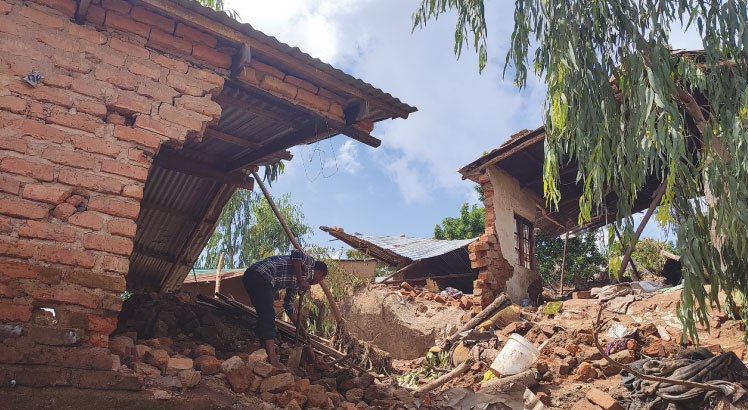COP 22: What’s in it for Malawi?
The Conference of Parties (COP) to the United Nation Framework Convention for Climate Change (UNFCCC) is currently underway in Marrakesh, Morocco. The conference this year aims at developing action plans of implementing the Paris Agreement that 195 countries adopted last year. But what is in this conference for Malawi? EPHRAIM NYONDO is covering the event.
Esther Jailosi from Traditional Authority (T/A) Chapananga in Chikwawa District is not here in the sprawling Marrakesh, the sparklingly pink tourist city of Morocco.
She is not part of the almost 20 000 delegates, drawn across the globe, to develop global action plans of helping her mitigate and adapt to effects of climate change she is suffering from.
The widowed mother of six, Jailos, early this year, suffered twin tragedies of nature’s anger. Her maize garden, her only source of food and income to send her children to school, was washed away by flash floods that hit the district. She did not give up.
“I planted again, thinking I will take advantage of the warmth left by the floods,” she told The Nation in September this year.
Dry spell swept across and withered her crop—leaving her dry, empty and without food.
This is not just Jailos’ story. Government, in the current 2016/17 consumption season, estimates that almost 8.5 million Malawi, almost half the population, are going without food.
The figure of the people going hungry, according to annual estimates from the previous five years, reveal an upward trend.
This means the challenge of floods and dry spells appear to have had a strong grip on Malawi. Experts argue that these two challenges are only effects of the climate change which is sweeping across the globe.
Malawi, according to the Global Climate Risk Index 2017, is one developing country facing intense side-effects of climate change.
The report is titled “Who suffers most from extreme weather events? Weather-related loss events in 2015 and 1996 to 2015”. The Global Climate Risk Index 2017 analyses to what extent countries have been affected by the impacts of weather-related loss events (storms, floods, heat waves etc.). The most recent data available—from 1996 to 2015—were taken into account.
The countries affected most in 2015 were Mozambique, Dominica as well as Malawi. For the period from 1996 to 2015 Honduras, Myanmar and Haiti rank highest.
“In the past year, African countries have been heavily struck by weather catastrophes. Mozambique and Malawi, ranking first and third in the annual index for 2015, were hit by severe floods as a result of serious rainfall which started in December 2014 and lasted through to the end of January 2015 and beyond,” reads the report.
It underlines that nearly one million people have been affected in both countries; more than 200 000 people had to leave their homes.
Regional Director of the Leadership for Environment and Development (LEAD) Southern and Eastern Africa Professor Sosten Chiotha paints how bad the situation is on the ground.
“Our water bodies are drying up. Our capacity to produce food is dwindling. Our energy is in crisis. These are climate change effects that, as a country, need to deal with,” he says.
Moved by these effects, Malawi, Chiotha inclusive, is here in Marrakesh, Morrocco, to be part of the 195 countries worldwide—referred to as parties—to develop actions plans on how poor and vulnerable people like Jailos can mitigate and adapt to climate change.
The meetings are referred to as Conference of Parties (COP) or, simply put, conference of nations under the United Nation Framework Convention for Climate Change (UNFCCC). These annual conferences began in 1995—that is why this year’s conference is referred to as COP 21.
Last year’s COP 21 in France was critical because of the development and adoption of the Paris Agreement, says Patricia Espinosa, executive of UNFCCC.
“During the COP21 in Paris 2015, 195 delegations adopted the Paris Agreement which plans to “contain” the average increase of the global temperature “well below 2 degrees Celsius” to match levels before the industrial era,” she says.
She adds that developed countries should continue to lead the way by committing to reduce their emissions. Developing countries are the ones “encouraged” to move towards the goals of reducing or limiting their emissions in every aspect of their economy. In return, they will receive financial support.
Espinosa also noted that as of October 6 2016, the membership threshold consisting of 55 countries representing the critical mass of 55 percent of greenhouse gas emissions worldwide was reached, allowing the implementation of the Paris Agreement.
President Peter Mutharika ratified the Paris Agreement in September while attending the United Nations General Assembly (Unga) in US.
The current COP underway, COP 22, hence focuses on the actions needed to achieve the various priorities outlined in the Paris Agreement.
These include issues related to adaptation, transparency, technology transfer, mitigation, capacity building, compensation for loss and damages, and – of course—financing.
“These are critical issues Malawi needs right now to fight climate change. We need skills transfer to our local communities so that their agricultural activities do not fall prey to effects of climate change,” says Chiotha.
Werani Chilenga, chairperson of Parliamentary Committee for Natural Resources, added that Malawi has come to the COP to join the forces for lobbying for increased financing to adaptation activities.
Chilenga’s insight joins Africa’s argument that despite contributing little to the destruction of the environment, the continent experiences the worst from climate change because of minimal adaptation tools.
“Generally, Malawi is in this year’s COP to be part of [countries] developing action plans that should accelerate local communities’ adaptation capacity to climate change which can be achieved by increased technological transfer and also financing,” says Chiotha.
Surely, if that can be achieved, Jailos would smile. She will, indeed, feel the importance of the COP meetings. But if that cannot be achieved, these gathering will remain what they are—just gatherings.






